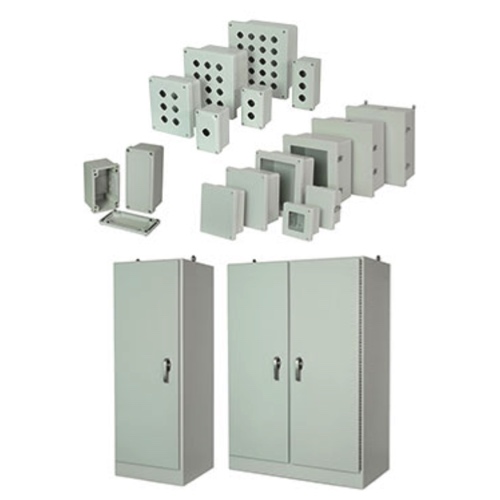Allied Moulded Electrical Enclosures

RSP Supply carries a full line of Allied Moulded enclosures engineered for reliable performance in demanding electrical applications. Manufactured using advanced thermoset and thermoplastic materials, Allied Moulded enclosures deliver exceptional protection against moisture, dust, and impact; making them ideal for industrial, commercial, and residential environments.
Allied Moulded enclosures are highly regarded across the electrical industry for their strength, corrosion resistance, and design innovation. The company’s automated manufacturing processes combine precision injection molding and resin transfer molding, ensuring consistent quality, tight tolerances, and long-term durability. These manufacturing methods also give each product a clean, uniform finish that complements any installation environment.
The Allied Moulded product line includes a wide range of enclosure types from small junction boxes to large industrial cabinets each designed to meet specific application requirements. Features such as high impact resistance, easy installation, and low maintenance make these enclosures a dependable choice for protecting electrical and electronic equipment. Their NEMA-rated designs meet industry standards for weatherproofing and safety, providing lasting performance indoors and outdoors alike.
More Information about Allied Moulded Enclosures
Allied Moulded nonmetallic electrical boxes and enclosures satisfy the exacting requirements of the electrical industry. They possess features like— robust impact resistance, uncomplicated installation, and reasonable rates—that seem almost custom-tailored for commercial applications and industrial environments. Yet these enclosures also serve many residential situations as well. What we see above all in associated marketing materials is the promise of protective reliability for electrical devices in a number of settings. That is the core message of Allied Moulded Products Inc.
FAQs
Q: What materials are used to make Allied Moulded enclosures?
Allied Moulded enclosures are constructed from advanced thermoset and thermoplastic materials that provide superior impact resistance, UV stability, and long-term durability in harsh environments.
Q: Are Allied Moulded enclosures suitable for outdoor use?
Yes. Many Allied Moulded enclosures are NEMA-rated for outdoor use, offering protection against dust, rain, and corrosion, making them ideal for exposed environments.
Q: What manufacturing processes does Allied Moulded use?
Allied Moulded utilizes compression molding, injection molding, and resin transfer molding to produce consistent, high-quality enclosures at competitive prices.
Q: What industries use Allied Moulded products?
Allied Moulded enclosures are widely used in industrial automation, telecommunications, construction, utilities, and residential electrical systems.
Q: Are Allied Moulded enclosures available in multiple sizes and configurations?
Yes. Allied Moulded offers a complete selection of enclosure sizes, styles, and mounting options to suit a wide variety of electrical and electronic installations.
Why Buy Allied Moulded Enclosure from RSP Supply
RSP Supply provides Allied Moulded enclosures known for their lightweight strength, corrosion resistance, and easy installation. With fast shipping, competitive pricing, and expert customer support, RSP Supply ensures you get the right nonmetallic enclosure for your electrical project - no matter the environment or application.

